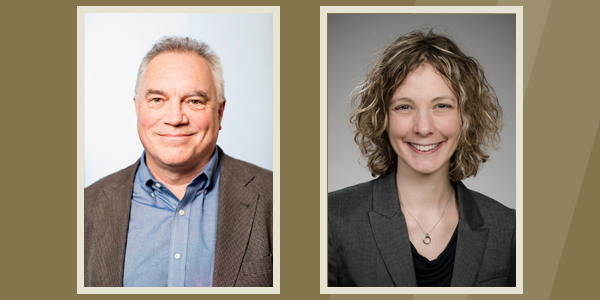Honor rare in early career; represents top two percent of bioengineers
University of Washington bioengineers Paul Kinahan and Kelly Stevens have been elected to the American Institute for Medical and Biological Engineering (AIMBE) College of Fellows.
Representing an elite group of the top two percent of accomplished medical and biological engineering professionals in the country, AIMBE Fellows provide active leadership and advocacy in the biomedical engineering field.
Kinahan, a joint professor of radiology and bioengineering, was recognized for his contributions to medical imaging technology using positron emission tomography and x-ray computed tomography.
Stevens, an assistant professor of bioengineering and of laboratory medicine and pathology, was selected for her work on pioneering approaches to map and replicate human tissues to advance bioengineered organs toward clinical therapy.
“Tremendously rare”
Because membership recognizes the impact of research advances, technical innovations or educational methods, it’s a rarity for assistant professors, such as Stevens, and those early in their careers to be elected.
“It is tremendously rare in fact; not to mention it’s a great personal achievement,” said Charlie Kim, director of operations and membership at AIMBE, of Stevens’ election.
In the last 10 years, only 4 of the 1,500 fellows elected have been assistant professors, Kim said.
Kinahan and Stevens were nominated by their peers, reviewed by College committees and elected by the full College of Fellows.
Kinahan’s research focuses on developing technologies in medical imaging using positron emission tomography (PET) and x-ray computed tomography (CT). He is part of the group that built the first prototype combined PET/CT scanner. PET/CT imaging is used in the clinic for patient healthcare and for basic research in neuroscience, oncology and cardiology.
Several of Kinahan’s developments are used in hospital imaging systems and research systems worldwide. His team collaborates closely with industry, physicians and other researchers to advance imaging to improve patient health.
Stevens’ research focuses on mapping human organs and engineering artificial human tissues. She applies expertise in synthetic biology, 3D bioprinting and building organoids (3D clusters of organ tissue) to her goal of assembling engineered human organs from scratch. She aims to translate her technologies into therapies for patients with heart and liver disease. Stevens is also a faculty member in UW Medicine’s Institute for Stem Cell & Regenerative Medicine.
Some of her recent achievements include 3D bioprinted tissues with entangled vascular networks for air and blood, 3D printed fluid systems that supply penetrating heat in patterns that trigger gene expression in human livers, and sci-Space technology, a technique that tracks cell positions and gene expression over time in a developing embryo. On Feb. 9, she was named an Allen Distinguished Investigator to support her work to build human livers in the lab.
Stevens a national advocate for diversity and inclusivity
Stevens is also a national leader in mentorship, community building and inclusivity in science. In 2021, she was elected to co-lead the National Academies of Science, Engineering, and Medicine 2021-2023 New Voices Cohort. She also co-founded and co-leads the 400-member, nationwide biomedical engineering UNITE movement, and co-leads the Genentech Research Awards Program, which grants research funding to underrepresented minority faculty in biomedical engineering.
UW BioE representation in AIMBE
Kinahan and Stevens will be formally inducted into the prestigious organization during the AIMBE virtual annual meeting on March 25, along with 152 colleagues. With their induction, 24 of UW BioE’s core faculty members, or nearly 50 percent, will be AIMBE Fellows, following Chun Yuan’s move to emeritus professor. Also notable is that 39% of UW BioE’s AIMBE Fellows are women.
AIMBE Fellows have been awarded the Nobel Prize, the Presidential Medal of Science and the Presidential Medal of Technology and Innovation and many also are members of the National Academy of Engineering, National Academy of Medicine, and the National Academy of Sciences.
AIMBE is a non-profit advocacy organization dedicated to improving lives through medical and biological engineering. AIMBE’s mission is to recognize excellence in, and advocate for, the fields of medical and biological engineering in order to advance society. Visit AIMBE’s website to learn more.



